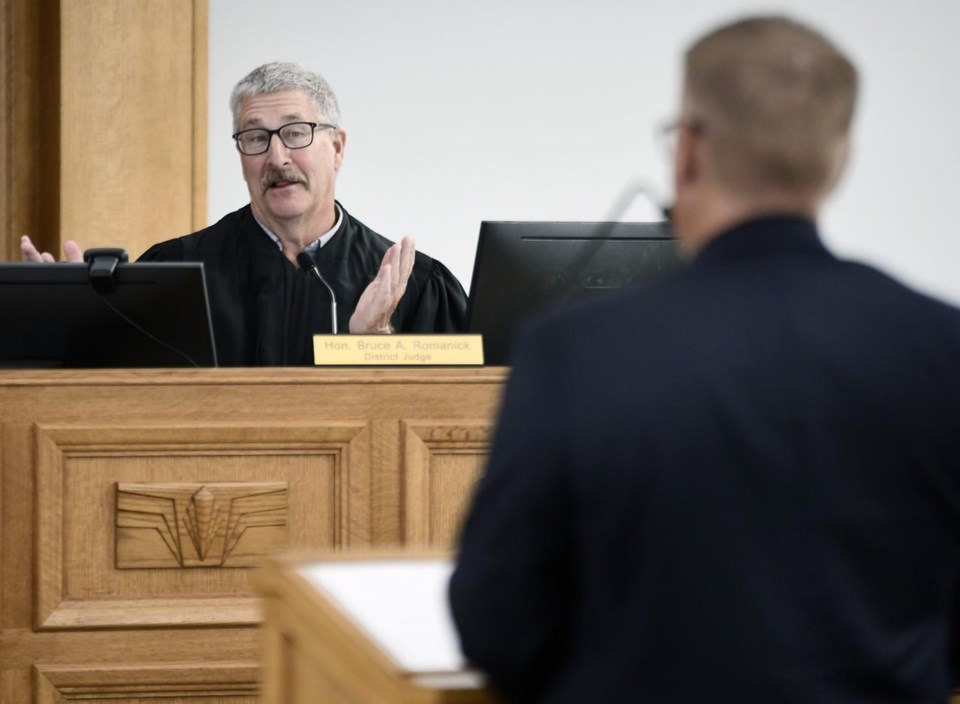BISMARCK, N.D. (AP) — A North Dakota judge ruled Monday that he will keep the state's ban on abortion from taking effect, saying there's a "substantial probability” that a constitutional challenge to the law will succeed.
Judge Bruce Romanick's ruling means abortion is still legal in North Dakota, though the state's only clinic — the Red River Women's Clinic of Fargo — shut down as it challenged the ban and has moved across the border to neighboring Minnesota.
Romanick last month rejected a request from North Dakota Attorney General Drew Wrigley to let the law take effect while the Red River clinic's lawsuit went forward. Romanick based his earlier decision on several factors, but Wrigley argued he had not sufficiently considered the clinic’s chances of prevailing in court. The North Dakota Supreme Court agreed and told Romanick to take another look.
In his earlier ruling, Romanick noted the clinic’s uphill battle. But in his ruling Monday, he said the clinic has a “substantial probability” of succeeding, though he noted that the question of whether abortion is a constitutional right in North Dakota has been contentious and has not been decided by the state's highest court.
Romanick said the purpose of a preliminary injunction is to maintain the status quo until a case can be settled on the merits.
But he also wrote there is a “substantial probability” that the law is unconstitutional because of the constraint it places on doctors. Specifically, he took issue with the fact that the ban allows cases of rape or incest to be raised as an affirmative defense to administering an abortion — but notes that doctors could be prosecuted in the first place.
This puts unreasonable burdens on doctors and pregnant women that are “not reasonably related to the goal of preserving life" — which the state has said is the purpose of the law. He wrote that if "women do not have a reasonable avenue in which to get safe abortions when their lives are in danger, the Statute does not serve its intended purpose.”
Wrigley, a Republican, said he was still analyzing the ruling.
“I’m unpersuaded by almost everything I read in the judge’s ruling and we look forward to responding,” he said.
Tammi Kromenaker, director of the Red River Women’s Clinic, said she was pleased that abortion remained “safe and legal” in the state.
"We want physicians who are treating patients to feel like they can use their best medical judgment and training and not be looking at the law books as to how they can take care of patients," she said.
In the weeks after the U.S. Supreme Court overturned Roe v. Wade earlier this year, the Red River clinic shut down its single location in Fargo and moved just a few miles across the state line to Moorhead, Minnesota, a state where abortion remains legal. But the clinic continued to press its lawsuit, arguing that the North Dakota constitution grants a right to abortion.
When Romanick blocked the law from taking effect last month, he acknowledged that the clinic had moved but noted doctors and hospitals would still be affected by the statute.
The law makes abortion illegal except in cases of rape or incest or when the life of the mother is in danger — any of which would have to be proven in court. Otherwise, a doctor who performs an abortion would face a felony charge, which abortion rights supporters say could stop doctors from performing abortions even if the mother’s health is at risk.
More than a dozen states had passed so-called trigger laws that were designed to outlaw most abortions if the high court threw out the constitutional right to end a pregnancy. While some states began enforcing the bans immediately other efforts to bar the procedure are tied up in the courts.
In Idaho, for example, a strict abortion ban is in effect, but a federal judge has temporarily barred the state from enforcing the ban in some medical situations while a lawsuit from the Department of Justice works through the courts. And last week Arizona’s attorney general has agreed not to enforce a near total ban on abortions at least until next year.
—-
Kolpack reported from Fargo, N.D.
James Macpherson And Dave Kolpack, The Associated Press




